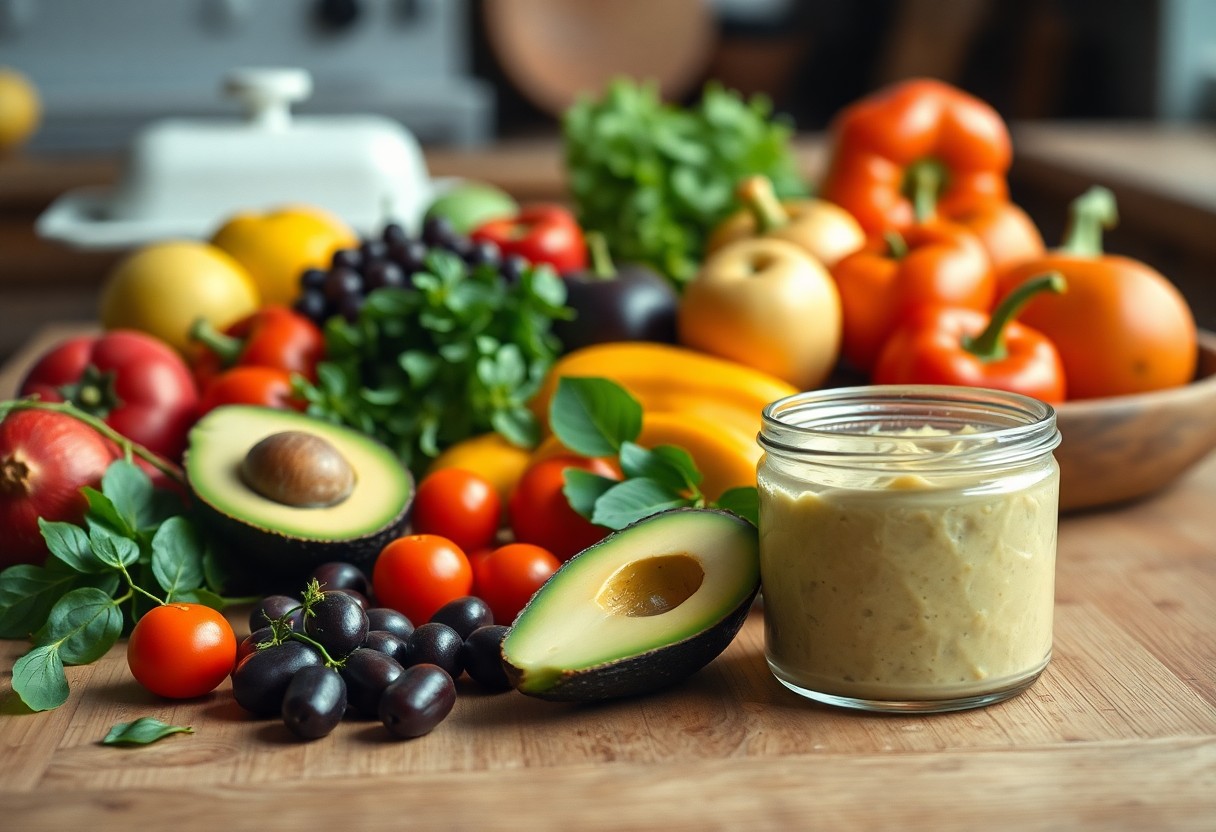With a new study indicating that higher butter consumption may increase your risk of premature death, you might want to reconsider how much butter you use in your meals. The research suggests that those who consume just about one tablespoon of butter daily are at a 15 percent greater risk of dying from all causes compared to those who consume less. In contrast, incorporating more plant-based oils into your diet has been linked to a 16 percent reduced risk of premature death, highlighting the importance of your dietary choices for long-term health.
Study Overview
Your habits in the kitchen might impact your lifespan more than you realize. A new study involving nearly 221,000 adults revealed that higher butter consumption correlates with a 15 percent increased risk of premature death, while plant-based oils can reduce this risk by 16 percent. Researchers tracked participants over three decades, providing insightful connections between dietary fats and longevity.
Participant Demographics
One notable aspect of the study was its participant profile, comprised primarily of adults in their mid-fifties, all free from common major health issues. This diverse group allowed researchers to evaluate dietary effects while controlling for confounding factors like age, BMI, and lifestyle choices.
Dietary Questionnaire Insights
To assess dietary habits, participants filled out comprehensive questionnaires every four years, detailing their consumption of butter and various oils. This method provided valuable insights into how everyday dietary choices may significantly impact longevity.
Consequently, the study’s findings highlighted that participants consuming higher amounts of butter—about 13 to 14 grams daily—faced increased mortality risks, while those consuming plant-based oils enjoyed a protective effect. Each additional 10 grams of butter heightened the risk of premature death by 12 percent, whereas a similar increase in plant-based oils lowered the risk of death from cancer by 11 percent. These results underscore the importance of dietary choices in promoting better health and longevity.
Impact of Butter Consumption
The consumption of butter has been linked to an increased risk of premature death, particularly when you consume it in higher amounts. A study indicates that those who consumed approximately 1 tablespoon (13-14 grams) of butter daily were 15 percent more likely to die from any cause during the study period compared to those with minimal butter intake.
Premature Death Risk
Above all, the study underscores a significant association between butter intake and overall health risks. Increased butter consumption correlates with premature death, highlighting the importance of dietary choices in your long-term well-being.
Comparison with Plant-Based Oils
Beside butter, the consumption of plant-based oils shows promising benefits for longevity. Below, you can see a comparison of the effects of butter versus plant-based oils on health risks:
Impact of Fats on Premature Death
| Fat Type | Impact on Premature Death Risk |
|---|---|
| Butter | +15% risk |
| Plant-Based Oils | -16% risk |
In addition, the beneficial impact of plant-based oils extends further. Those consuming the highest amounts, approximately 5 teaspoons daily, experienced an 11 percent lower risk of premature death from cancer, alongside a 6 percent reduction in heart disease fatalities. Here’s a deeper look at the effects:
Plant-Based Oils Impact
| Oil Type | Health Benefits |
|---|---|
| Canola, Soybean, Olive Oils | Reduce risk of early death |
| Corn, Safflower Oils | No significant effect |
Types of Fats and Health
Now, understanding the different types of fats you consume is important for your overall well-being. The right balance can significantly influence your long-term health. Here are key differences:
| Type of Fat | Characteristics |
|---|---|
| Saturated Fats | Commonly found in butter and red meat; may raise bad cholesterol. |
| Unsaturated Fats | Found in plant-based oils; beneficial for heart health. |
| Omega-3 Fatty Acids | Type of unsaturated fat, beneficial for inflammation. |
| Trans Fats | Found in processed foods; harmful to your heart health. |
| Monounsaturated Fats | Healthy fats; found in olive oil and avocados. |
Saturated vs. Unsaturated Fats
Fats play a significant role in your diet, influencing your overall health and longevity. Saturated fats, primarily found in animal products like butter, can raise bad cholesterol levels, increasing the risk of heart disease. In contrast, unsaturated fats found in plant oils, such as canola and olive oil, promote heart health and may reduce mortality risk.
Effects on Cholesterol Levels
Cholesterol levels can be significantly affected by the types of fats you include in your diet. Unhealthy fats, like saturated fats found in butter, can raise your LDL cholesterol, which is known as bad cholesterol. On the other hand, unsaturated fats, particularly present in plant-based oils, can improve your HDL cholesterol levels, leading to better overall cardiovascular health. Adjusting your fat intake towards healthier options can greatly impact your cholesterol and reduce the risk of premature death.
Fats are not created equal when it comes to cholesterol levels. Consuming saturated fats can lead to an increase in LDL cholesterol, heightening your risk for heart disease. In contrast, incorporating more unsaturated fats into your diet helps maintain healthy cholesterol levels and can significantly enhance your heart’s health. Making these dietary choices not only benefits your cholesterol profile but also contributes to longevity and reduces the risk of chronic diseases.
Plant-Based Oils and Longevity
Once again, research highlights the benefits of incorporating plant-based oils into your diet for a longer life. Studies indicate that consuming these oils can lower your risk of premature death, especially when compared to higher butter intake. By choosing healthier fats, you can improve your overall well-being and longevity.
Types of Beneficial Oils
Behind the positive effects on your life span, several specific types of oils stand out:
| Oil Type | Impact on Longevity |
| Canola Oil | Lower risk of death |
| Soybean Oil | Supports heart health |
| Olive Oil | Rich in antioxidants |
| Corn Oil | No significant effect |
| Safflower Oil | No significant effect |
Recognizing the differences in oils can help you make informed choices for your meals.
Associated Health Benefits
Before choosing your oils, consider the significant health benefits they can offer. Incorporating oils like canola, soybean, and olive can enhance your blood lipid profiles and may reduce inflammation. Each additional 10 g of plant-based oils daily is associated with an 11% lower risk of premature death from cancer.
In addition to reducing cancer risk, using these oils can also lead to a 6% decrease in fatalities from heart disease. Don’t overlook the importance of a balanced diet—regular consumption of these oils can improve your health as part of a broader nourishing eating pattern. Ensuring you embrace plant-based oils over butter can make a significant difference in achieving a healthy lifestyle and longevity.

Dietary Recommendations
Unlike the traditional belief that butter enhances flavor, recent evidence suggests that reducing your butter intake may contribute to a longer life. The findings indicate that consuming even small amounts, such as one tablespoon a day, can increase the risk of premature death by 15%. In contrast, incorporating plant-based oils like olive, canola, and soybean can offer significant longevity benefits.
Moderation and Portion Control
By focusing on moderation, you can balance your fat intake while still enjoying flavorful foods. Aim to limit butter consumption and replace it with healthier alternatives, ensuring that fats comprise no more than 20 to 35 percent of your daily calories.
Healthy Eating Habits
For long-term wellness, develop healthy eating habits that prioritize nutrient-rich foods. Making simple switches, such as using plant-based oils for cooking or salad dressings, can improve your diet quality. Studies show that those who consume healthier oils, like olive or canola, are 16% less likely to experience premature death, particularly from cancer. Incorporating more whole foods, vegetables, and lean proteins into your meals will provide a foundation for a thriving lifestyle.
Healthy eating habits not only promote longevity but also enhance your overall health. By focusing on a varied diet rich in whole foods, you can decrease the risk of chronic diseases. Prioritize meals that incorporate plant-based oils while avoiding ultra-processed foods that may negate the benefits of healthy fats. This balanced approach will support your well-being and help manage your calorie intake effectively.

Study Limitations
To understand the implications of the research on butter consumption and longevity, it’s important to consider its limitations. The study’s reliance on self-reported dietary habits introduces potential inaccuracies, which could affect the final conclusions drawn about the relationship between butter intake and risk of premature death.
Participant Diversity
To ensure broader applicability of the findings, greater participant diversity is needed. Most study participants were white healthcare workers, which may limit the generalizability of the results to different demographics and populations.
Reliance on Self-Reported Data
Between dietary questionnaires and individual recollections, self-reported data can lead to inconsistencies in the study. With human error in recalling and reporting dietary habits, you may find that the actual butter and oil consumption differs significantly from reported values. This could skew results, making it challenging to draw definitive conclusions about the impacts of butter on your health. The study highlights consumers of butter and plant-based oils and their correlation with a 15% higher risk of death, but these figures should be viewed cautiously due to potential reporting inaccuracies.
Lower Butter Consumption May Be Tied to a Longer Life
With these considerations, you might want to rethink your dietary fat choices for better longevity. Reducing butter intake in favor of plant-based oils like canola, soybean, and olive oil could enhance your overall health and potentially decrease your risk of premature death. Embracing healthier fats and incorporating them into balanced meals may contribute positively to your long-term wellbeing. Be mindful of moderation to maximize the benefits and support your overall health.
FAQ
Q: How does butter consumption impact longevity according to recent studies?
A: Recent studies have indicated that high butter consumption is linked to an increased risk of premature death. Specifically, individuals who consumed about one tablespoon of butter daily were found to be 15% more likely to die from all causes compared to those who consumed little to no butter. The health risks associated with butter are primarily due to its high saturated fat content, which can raise bad cholesterol levels in the blood, thereby increasing the risk of heart disease.
Q: What types of oils are associated with a decreased risk of early death?
A: Plant-based oils such as canola, soybean, and olive oil have been associated with a lower risk of premature death. People who consumed higher amounts of these oils experienced a 16% reduction in mortality during the study. These oils are rich in unsaturated fats, which are considered healthier for the body as they can improve blood lipid profiles and reduce inflammation, contributing to overall better health.
Q: What dietary approaches can promote longevity while incorporating fats?
A: To promote longevity, it is important to incorporate healthy fats into your diet mindfully. Utilizing plant-based oils as part of meals—such as using them in salad dressings or for cooking vegetables and lean proteins—can enhance diet quality and potentially reduce the risk of cardiovascular diseases and cancer. However, moderation is key; it is advised that fats, including healthy oils, should account for 20 to 35 percent of your daily caloric intake to avoid excess calorie consumption and weight gain.


